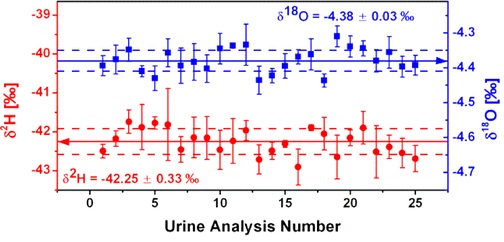Direct Analysis of δ2H and δ18O in Natural and Enriched Human Urine Using Laser-Based, Off-Axis Integrated Cavity Output Spectroscopy
應(yīng)用LGR液態(tài)水穩(wěn)定同位素分析儀測(cè)量尿液中的氫氧同位素
?
??Los Gatos Research, 67 East Evelyn Ave, Suite 3, Mountain View California 94043, United States
??Department of Ecology, Physiology and Ethology, IPHC-DEPE,?Université de Strasbourg, 23 rue Becquerel 67087 Strasbourg France
§?Division of Endocrinology, Metabolism, and Diabetes/Division of Geriatrics,?University of Colorado Anschutz Medical Campus, 12801 East 17th Ave, Aurora, Colorado 80045, United States
⊥?Institute of Biological and Environmental Sciences,?University of Aberdeen, Tillydrone Ave Aberdeen, AB24 2TZ, Scotland, U.K.
∥?State Key laboratory of Molecular and Developmental Biology, Institute of Genetics and Developmental Biology,?Chinese Academy of Sciences, Beijing, China
?
Abstract

The stable isotopes of hydrogen (δ2H) and oxygen (δ18O) in human urine are measured during studies of total energy expenditure by the doubly labeled water method, measurement of total body water, and measurement of insulin resistance by glucose disposal among other applications. An ultrasensitive laser absorption spectrometer based on off-axis integrated cavity output spectroscopy was demonstrated for simple and inexpensive measurement of stable isotopes in natural isotopic abundance and isotopically enriched human urine. Preparation of urine for analysis was simple and rapid (approximately 25 samples per hour), requiring no decolorizing or distillation steps. Analysis schemes were demonstrated to address sample-to-sample memory while still allowing analysis of 45 natural or 30 enriched urine samples per day. The instrument was linear over a wide range of water isotopes (δ2H = ?454 to +1702 ‰ and δ18O = ?58.3 to +265 ‰). Measurements of human urine were precise to better than 0.65 ‰ 1σ for δ2H and 0.09 ‰ 1σ for δ18O for natural urines, 1.1 ‰ 1σ for δ2H and 0.13 ‰ 1σ for δ18O for low enriched urines, and 1.0 ‰ 1σ for δ2H and 0.08 ‰ 1σ for δ18O for high enriched urines. Furthermore, the accuracy of the isotope measurements of human urines was verified to better than ±0.81 ‰ in δ2H and ±0.13 ‰ in δ18O (average deviation) against three independent isotope-ratio mass spectrometry laboratories. The ability to immediately and inexpensively measure the stable isotopes of water in human urine is expected to increase the number and variety of experiments which can be undertaken.
?
?查看原文:http://pubs.acs.org/doi/pdfplus/10.1021/ac3016642